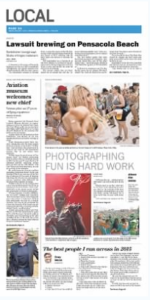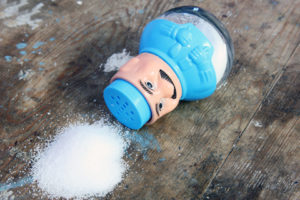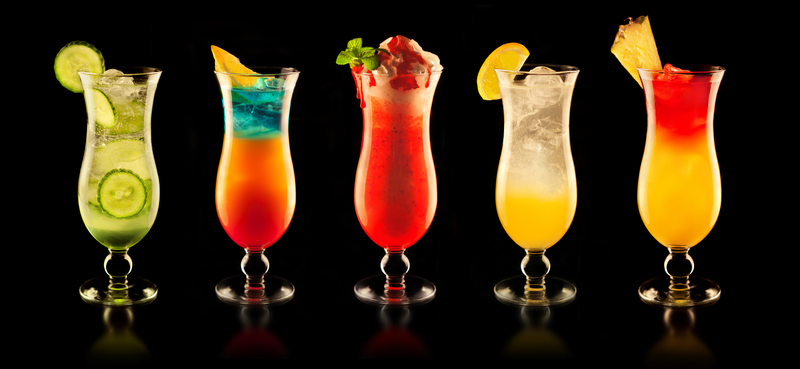Florida’s First Judicial Circuit recently found it unlikely that the Sandshaker Lounge would be able to prove trademark dilution of its ‘Shaker’ mark by the ‘Shaka Bar.’ Here’s the story.
Livin’ off sponge cake . . .
WAY UP in the panhandle — about a six-hour drive from Orlando — one beach bar has been trying to “shake down” another with a trademark lawsuit.
The Sandshaker Lounge sits next to a Travelodge on a strip among many other beach bars and eateries in Pensacola Beach. It seats 50-75 customers in rooms both indoor and out, and each week showcases live bands such as “Lektric Mullet” and “Trunk Monkey.” It’s been a fixture in Pensacola Beach for decades and has a colorful history.
A nine-minute walk up the bridge from the Sandshaker is the Aloha Wine & Liquor store, the rear patio of which faces Little Sabine Bay. There, fishers dock their boats and sometimes anchor their persons at Aloha’s 10-stool outdoor tiki bar for a mai tai or Miller Lite. The tiki bar, the “Shaka,” is named for the Hawaiian word for the “hang loose” hand gesture popular among surfers — shaka — where thumb and pinky point out while other fingers fold downward. Founded in 2013, the Shaka Bar is also frequented by locals who just like to watch the sunset over the water while sipping drinks like a ginger lemonade made with Deep Eddy vodka.
Patrons driving from mainland Pensacola to the Sandshaker pass Aloha Wine & Liquor. Facing the drivers is a concrete “Aloha WINE & LIQUOR” sign with a readerboard that says “SHAKA BAR” in removable letters. It is this sign, the Sandshaker complains, that confuses potential Sandshaker customers, who are mistakenly led to the Shaka Bar instead of the Sandshaker.
Sandshaker shakes the Shaka
After Aloha’s owners added “SHAKA BAR” to its marquee in 2013, the Sandshaker filed an application to trademark “Shaker,” as it sometimes calls itself the “Shaker Bar.”
In November 2014, it received a federal trademark registration for the word mark “Shaker” as it related to a package store and live music entertainment.

“Lawsuit Brewing on Pensacola Beach” in the Pensacola News Journal, Page A-3, on Jan. 1, 2016.
In November 2015, the Sandshaker filed a lawsuit against the owner of Shaka Bar and Aloha Wine & Liquor, RKR Beverages, for unfair competition under Florida’s Deceptive and Unfair Trade Practices Act and dilution of trademark.
Five months later, the Sandshaker filed a motion for injunctive relief, asking the Court to enjoin RKR from using the name “Shaka Bar.” The Court held an evidentiary hearing on December 12, 2016, and, on January 25, 2017, denied the motion. The Court’s order made the FLW Supplement last week.
At the hearing, the Sandshaker presented evidence from its employees and owners that customers had told them that the Shaka Bar’s sign had confused them as to the Sandshaker’s location. The Shaka Bar, in turn, presented evidence to show it was not using the term “Shaka” to steer customers away from the Sandshaker, and emphasized the Hawaiian meaning of Shaka as being important in Aloha’s tiki-bar theme.
After listening to the evidence, the Court found that the Sandshaker did not prove an essential element required to obtain temporary injunctive relief: “substantial likelihood of success on the merits.” In other words, the Court found no good reasons to expect Sandshaker would win its claims.
Nothin to show but this brand new tattoo . . .
The Court emphasized that the Sandshaker had sued not for trademark infringement, but for trademark dilution, which is a wholly different claim. To prove a claim for trademark dilution under section 495.151(1), Florida Statutes, a plaintiff must prove that (1) its mark is famous in the state and (2) another’s use of the mark or trade name is likely to cause its dilution.
 First, the Court found the mark “Shaker” was not “famous.” It noted that, to be “famous,” a mark must “be truly prominent and renowned.” Fla. Int’l Univ. Bd. of Trustees v. Fla. Nat’l Univ., Inc., 91 F.Supp.3d 1265, 1286 (S.D.Fla. 2015). It must be “highly distinctive” or there must be proof that the other’s use of the mark decreases the plaintiff’s commercial value. Great S. Bank v. First S. Bank, 625 So. 2d 463, 470-71 (Fla. 1993).
First, the Court found the mark “Shaker” was not “famous.” It noted that, to be “famous,” a mark must “be truly prominent and renowned.” Fla. Int’l Univ. Bd. of Trustees v. Fla. Nat’l Univ., Inc., 91 F.Supp.3d 1265, 1286 (S.D.Fla. 2015). It must be “highly distinctive” or there must be proof that the other’s use of the mark decreases the plaintiff’s commercial value. Great S. Bank v. First S. Bank, 625 So. 2d 463, 470-71 (Fla. 1993).
Here, while the Sandshaker has used the term “Shaker,” it mostly relies on other terms, such as “Sandshaker.” The Sandshaker’s freestanding sign and sign atop its entrance both boast “Sandshaker Lounge & PKG” more prominently than the replaceable marquee letters that spell out “THE SHAKER BAR” on the freestanding sign. Moreover, the website domain is sandshaker.com, and the bar appeared to not use the “Shaker” mark outside the Pensacola region.
Next, the Court found that the term “Shaker” was not likely to be diluted by the Aloha’s use of “Shaka.” It noted that shaka has a distinct meaning, in Hawaiian, that is wholly different from “Shaker.” Moreover, the Court noted, the two bars are very different: The Sandshaker is open year-round, accommodates 50-75 customers, and has a strong focus on live entertainment. In contrast, the Shaka Bar is not open year-round, limited to 10 bar stools and some picnic tables, and focuses on serving people who have just finished fishing. The bar itself is limited to a small number of bar stools and picnic tables. Words that are “sufficiently different in sound, appearance, connotation, and commercial impression” negate the likelihood of confusion. In re Hearst Corp., 982 F.2d 493, 494 (Fed.Cir. 1992).
The Court incorporated this analysis of the trademark dilution claim into the Sandshaker’s claim for unfair competition, finding, therefore, there was not enough proof of likely success on the merits.
Overall, the Court found that, because the Sandshaker failed to prove, via its motion and evidence presented at the hearing, that it had a substantial likelihood of succeeding on the merits at trial, the Court denied the motion for temporary injunction without examining the other elements.
What will happen now?
Regardless of the order, the lawsuit continues. The Sandshaker’s loss on this one motion does not mean, necessarily, that it will lose at trial: only that the judge found the Sandshaker did not prove, at the hearing, that it was likely to win at trial. The Sandshaker still may obtain additional evidence to prove its claims, find more witnesses, and, if this is a jury case, the trier of fact will not be the same judge that decided the motion but rather, a jury, which can provide unpredictable results. It is, essentially, possible for a party to lose a motion for temporary injunction but win the overall case. Additionally, because the lawsuit is still active (and it’s state court), the Sandshaker could even do something unexpected like move to amend its complaint to change its dilution of trademark claim to trademark infringement, or something else. Essentially, outside the two parties reaching a settlement between themselves, it is difficult to tell which way a lawsuit will turn.
Most likely the parties will have a mediation and reach a settlement. The reason is that evidentiary hearings are very time consuming and costly, and both parties are probably tired of paying legal fees at this point. Taking a case to trial brings a whole other set of expenses. I anticipate, however, that, given the Court’s recent ruling, the Shaker will have the upper hand at mediation.
Do you have an issue with your business?
If you have an issue where you think another business is causing yours trademark dilution, or if you have any other issue you’d like to protect, call our law office at 407-965-5519. You can also schedule a consultation with Attorney Conlin right now by using this link.




1 comment